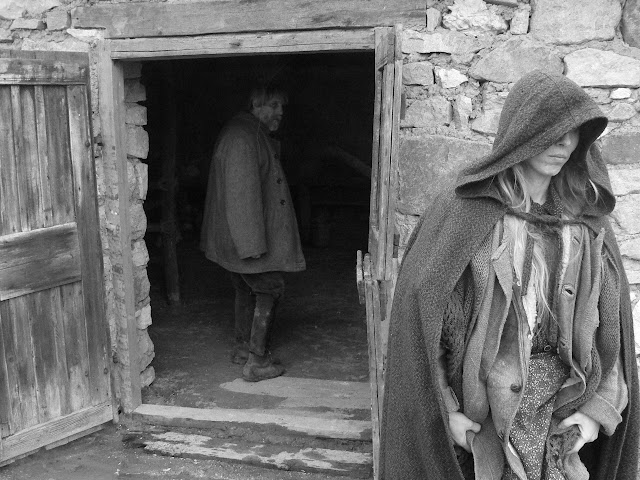"In Turin on 3rd January, 1889, Friedrich Nietzsche steps out of the doorway of number six, Via Carlo Albert. Not far from him, the driver of a hansom cab is having trouble with a stubborn horse. Despite all his urging, the horse refuses to move, whereupon the driver loses his patience and takes his whip to it. Nietzsche comes up to the throng and puts an end to the brutal scene, throwing his arms around the horse’s neck, sobbing. His landlord takes him home, he lies motionless and silent for two days on a divan until he mutters the obligatory last words, and lives for another ten years, silent and demented, cared for by his mother and sisters. We do not know what happened to the horse.” These are Hungarian filmmaker Béla Tarr's introductory words on his latest, and possibly last work of cinema, The Turin Horse. The film then proceeds in telling the story of this unknown cab driver as he goes back into his brutally harsh world of shit. A world that may make many a film goer quite uncomfortable in their seats.
Let's not kid ourselves. The cinema of Béla Tarr is not a cinema for everyone. It is a hard and harrowing cinema. It is a cinema full of despair and longing. It is a lonely, desperate and miserablist cinema. The director himself has spoken of how he sees the world as shit, and in turn we see that in his work. It is not a cinema for those faint of heart. But for those who get Béla Tarr, and understand what it is he is doing with his films, it is a cinema of beleaguered beauty. A cinema of transcendental ideas. It is a cinema full of grim Hobbesian views but also a cinema that makes sheer and succulent imagery out of that aforementioned world of shit. For many, especially those used to a faster editing style, it is a cinema of painstakingly long takes, but for the few that do see Tarr as the visionary master of poetic modernism that he is, it is a cinema of ultimate pulchritude.
With three true masterpieces already under his Hungarian belt, Tarr has fashioned yet a fourth film worthy of such accolades. With the director's latest (and if one were to believe the man's own hype, his final film), a work called The Turin Horse (actually co-directed by long time collaborator, film editor Agnes Hranitzky), one can easily see the filmmaker is back in the brilliantly subversive mad genius mode that gave the world such masterpieces as Damnation in 1988, Sátántango in 1994 and Werckmeister Harmonies in 2000, before faltering a step or two with his flawed but still quite impressive Man From London in 2007. A mode that has influenced many a modernist filmmaker (or should I say remodernist filmmaker, after the movement indirectly started by the works of Tarr) and made Gus Van Sant go from Good Will Hunting to Gerry. This is a mode that makes the director's films seem like classic works of cinema with their immediate release. This is the mode that all we true Tarrheads, from stalwart defenders like Susan Sontag and J. Hoberman to yours truly, clamour for, and this is the mode that Tarr has given us for what the director calls his final film.
But then, as more than alluded to up front, Mr. Tarr is definitely not everyone's cup of tea. In fact he probably isn't even everyone's cup of anything. We Tarrheads are surely outnumbered, but naysayers be damned! This is what is meant when someone speaks of pure cinema.The auteur is known for having an oeuvre of long (some could say excruciatingly long in a few cases - especially in one case in particular), very methodical, oft-times meandering along at the breakneck pace of an especially melancholy sloth, works that derive the same type of socio-religious pleasure as Dreyer, Bresson and Tarkovsky all rolled into one great big beautiful three-headed, six-armed, six-eyed apocalyptically-minded cinematic beast from the very bowels of Hades. Hyperbole aside, the basic gist of all that was to state the obvious fact (for those that know the man and his films) that to see a Béla Tarr film is to see a work that may be demanding to those uninitiated, but a work of true mad genius indeed.




